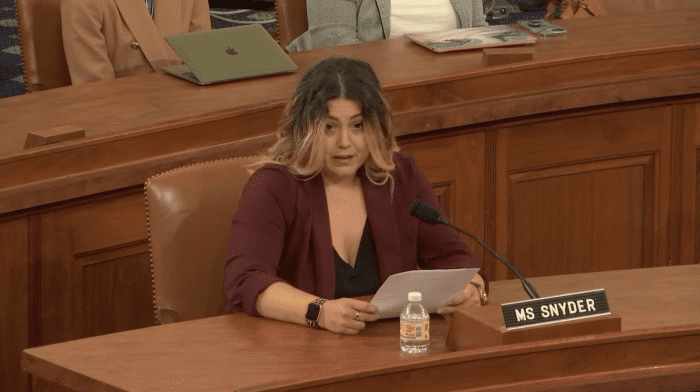‘We are so burned out, exhausted, overworked and overtired’: Women plead with Congress to act on paid leave and rising child-care costs during emotional hearing on Capitol Hill
June 16, 2022
By Emma Ockerman
Appearing before the House Ways and Means Committee, women described how the economy was failing them

Tori Snyder, a single mother and business owner from Pittsburgh, testified before the House Ways and Means Committee on Wednesday, asking for federal investments in child care, paid leave and other areas. HOUSE WAYS AND MEANS COMMITTEE/YOUTUBE
The economy is failing American women.
That’s the message multiple speakers conveyed — sometimes through tears — to the House Ways and Means Committee during a hearing Wednesday, decrying what they described as the country’s lack of paid leave, its broken care economy and rising costs. In his opening statement, Chairman Richard Neal, a Democrat from Massachusetts, said that, although the COVID-19 pandemic did not create the circumstances that force many women to juggle their careers, care for loved ones and financial instability, it certainly made all of those things worse.
“We are so burned out, exhausted, overworked, and overtired,” Tori Snyder, a single mother to a 4-year-old boy and small-business owner in Pittsburgh, as well as a member of the advocacy group MomsRising, told the legislators. “We’re struggling even more now because it’s so expensive to feed our children. I hope you will invest in the care and the care infrastructure working families need with paid leave for all, affordable childcare, home and community-based services and coverages that address all of our healthcare needs.”
While women’s participation in the labor force is increasing after dropping off earlier in the pandemic, there were still 656,000 fewer women working in May 2022 compared to February 2020, just before COVID-19 hit the U.S., according to the National Women’s Law Center. What’s more, many women who overcame mass school closures, layoffs, and child-care shortages to return to work are left without the same pandemic-era benefits that had once helped them scrape by, since the enhanced child tax credit, a federally mandated paid-leave program, and expanded unemployment benefits have all since expired, despite an increased cost of living.
‘My daughter is almost 2, and I’d like to put her in daycare. But the dangers of COVID still persist, and everything is so expensive.’— Nija Phelps of Milford, Conn.
Nija Phelps of Milford, Conn., said that while her family desired comprehensive paid leave back in 2014, when she and her husband had to quit their jobs to care for her mother-in-law, the need has only increased since then. She was furloughed due to the pandemic in 2020, when she was pregnant with her first child. Her husband was only able to take six weeks of paid leave to care for their newborn, and going back to to work meant potentially exposing himself, the baby and Phelps’s mother-in-law to COVID-19. But their family didn’t really have a choice.
“We had to do what we had to do to keep his job,” Phelps said. “Now my husband has lost his job, and I’m only back to work one day every other week, down from three to four days a week. We’re in a state of constantly being on guard and trying to prepare for whatever comes next, and still stay on top of our finances and caring for our family. My daughter is almost 2, and I’d like to put her in daycare. But the dangers of COVID still persist, and everything is so expensive.”
The expanded unemployment benefits and child-tax credit were a “lifeline,” Phelps said. Now that they’re gone, Phelps’ family is dipping into their retirement savings.
‘I struggled to pay rent, put gas in my car, buy groceries, and pay for my mom’s medications.’— Donna Price of Cleveland, Ohio
Donna Price of Cleveland had a similar story of making tough choices during the pandemic. She cares for her 18-year-old autistic son and her disabled mother, on top of being a nurse. Her son’s mental health has suffered during the pandemic, and Price said that she had to take eight weeks off without pay to supervise him early last year, when his school and care program went fully remote due to a surge in the virus.
“I struggled to pay rent, put gas in my car, buy groceries, and pay for my mom’s medications,” Price, who is also a member of MomsRising, said. “I was facing $2,000 in unpaid gas bills and $800 in unpaid electric bills. We only made it through with help from my older son and my daughter, who’s a social worker and a police officer. Otherwise, I don’t know what I would’ve done.”
Eventually, Price had to leave her job at a hospital and take a contract nurse position so she could have more flexibility and better care for her son and mother — even though that meant lower pay and fewer benefits.
“I know so many working women can relate to my story,” Price said. “As moms, essential workers, and caregivers for elderly parents, we go out every day and do what we need to do to make sure everyone else is cared for. But sometimes it feels like no one is making sure we’re okay. There are days when I just want to know that my health and my financial and emotional well-being matter. That my elected leaders have my back.”
‘My business and other businesses are struggling with the effects of inflation, and I am concerned about the prospects for a recession next year.’— Alicia Huey, National Association of Home Builders
Legislators were divided on how to solve the problem, though. Democrats continued to push the universal paid family and medical leave proposal promoted in President Joe Biden’s Build Back Better agenda, while Republicans railed against “Bidenflation” and said Democrats weren’t open to negotiating with them. They instead voiced their support for a bill that would give incentives to employers who offered such benefits to their workers.
“Under President Biden, working women haven’t had it this bad in decades,” Republican Rep. Kevin Brady, the ranking member on the House Ways and Means Committee, said. “And with a looming recession, real wages shrinking, and even higher gas prices ahead, it looks to be getting worse.”
One witness testified in support of the Republican plan: Alicia Huey, the first vice chairman of the board for the National Association of Home Builders and a custom home builder, remodeler, and developer in Birmingham, Ala. She told the legislators that the trade group “strongly believes Congress must pursue flexible, targeted, and incentive-based strategies” for child care and paid leave. She noted, too, that the costly building materials, inflation, and labor constraints are making housing more expensive, which is similarly burdening families and needs equal attention.
“My business and other businesses are struggling with the effects of inflation, and I am concerned about the prospects for a recession next year,” Huey said. “Solving these issues in a bipartisan manner should be a matter of urgency. Critical issues like paid leave and affordable childcare, alongside affordable housing, need solutions with an immediate impact to help working families and small businesses.”
But Democrats were emphatic on universal paid family and medical leave being the best answer, and some grew frustrated with Republicans repeatedly blaming Democrats for rising gas prices and inflation during the hearing.
“It must feel a little odd for you to being here, giving testimony about your personal experiences, and be told, essentially, that the problem is really Biden, gasoline, and inflation,” Rep. John Larson, a Connecticut Democrat, said, addressing the witnesses. “Apparently, what you had to say didn’t break through, or there’s a principle going on here that says government mandates are horrific, we should avoid these at all costs.”






